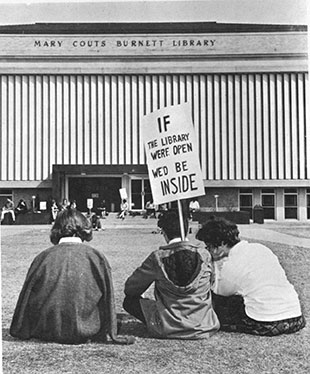Protesting the Library in the 1960s
The Mary Couts Burnett Library used to close on Sundays … until students waged a gentle protest.

TCU students protesting the library's lack of Sunday hours in the '60s.
Protesting the Library in the 1960s
The Mary Couts Burnett Library used to close on Sundays … until students waged a gentle protest.
The renovated Mary Couts Burnett Library offers state-of-the-art facilities almost 24 hours a day, seven days a week. But this kind of access to the library wasn’t always the case, especially on weekends.
On the lawn outside the library in February 1963, a group of students gathered to protest. It wasn’t a march, and it wasn’t a sit-in. It was a sit-out.
Many students, especially those who worked while attending classes, had lobbied the library staff for open hours on Sundays. A 1962 Skiff article titled, “Never on Sunday” remarked that, “Sunday, despite the Christian tradition, usually is not a day of rest for students. . . . It could be an excellent day for research and other library work.”
Students also reminded university administration that other Southwest Conference schools had regular Sunday library hours. At first, administrators were unmoved, claiming that Sunday hours would stretch the budget and students wouldn’t use the library on Sundays anyway.
But, in the fall semester of 1962, the library had opened on two Sundays from 2 to 6 p.m. By the beginning of the next spring semester, students were again agitating for Sunday openings.
On that Sunday afternoon in 1963, a group of students took the next step. With their protest signs, they gathered books and papers, and “sat out” on the lawn around the library to study.
“If the Library were open, we’d be inside,” read several signs. One sign, posted on the (locked) front doors of the library stated: “This door to our education is closed.”
The 1963 Horned Frog described the event this way: “Not a shot was fired. Not a battle cry was heard. But it was still a revolt.”
The library committee finally agreed to schedule regular Sunday hours. Starting in the fall of 1963, they opened on Sundays. The next year, the library committee included students as members for the first time.
Sources: The Horned Frog, 1963; Prologue: The TCU Library to 1983, Betsy Feagan Colquitt, 1983; TCU library website.

Your comments are welcome
Comments
Related reading:
Mem’ries Sweet
Homecoming: A Family Celebration
TCU’s first homecoming had parades and class parties – but no football. The game came later.
Campus News: Alma Matters
What date (or event) most changed the course of history?
Eight faculty members answer the question.